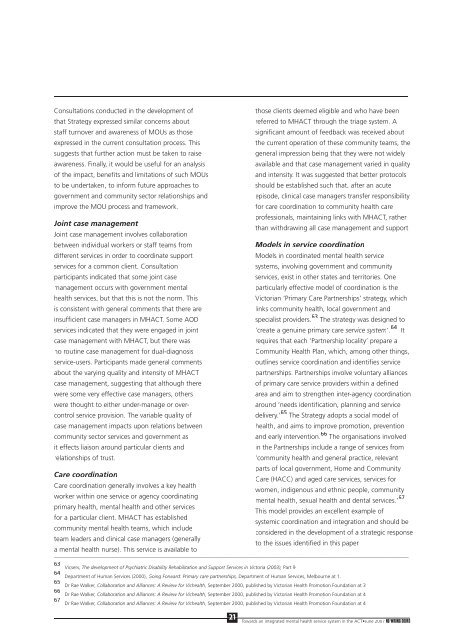actcoss text final.indd - ACT Council of Social Service
actcoss text final.indd - ACT Council of Social Service
actcoss text final.indd - ACT Council of Social Service
Create successful ePaper yourself
Turn your PDF publications into a flip-book with our unique Google optimized e-Paper software.
Consultations conducted in the development <strong>of</strong><br />
that Strategy expressed similar concerns about<br />
staff turnover and awareness <strong>of</strong> MOUs as those<br />
expressed in the current consultation process. This<br />
suggests that further action must be taken to raise<br />
awareness. Finally, it would be useful for an analysis<br />
<strong>of</strong> the impact, benefits and limitations <strong>of</strong> such MOUs<br />
to be undertaken, to inform future approaches to<br />
government and community sector relationships and<br />
improve the MOU process and framework.<br />
Joint case management<br />
Joint case management involves collaboration<br />
between individual workers or staff teams from<br />
different services in order to coordinate support<br />
services for a common client. Consultation<br />
participants indicated that some joint case<br />
management occurs with government mental<br />
health services, but that this is not the norm. This<br />
is consistent with general comments that there are<br />
insufficient case managers in MH<strong>ACT</strong>. Some AOD<br />
services indicated that they were engaged in joint<br />
case management with MH<strong>ACT</strong>, but there was<br />
no routine case management for dual-diagnosis<br />
service-users. Participants made general comments<br />
about the varying quality and intensity <strong>of</strong> MH<strong>ACT</strong><br />
case management, suggesting that although there<br />
were some very effective case managers, others<br />
were thought to either under-manage or overcontrol<br />
service provision. The variable quality <strong>of</strong><br />
case management impacts upon relations between<br />
community sector services and government as<br />
it effects liaison around particular clients and<br />
relationships <strong>of</strong> trust.<br />
those clients deemed eligible and who have been<br />
referred to MH<strong>ACT</strong> through the triage system. A<br />
significant amount <strong>of</strong> feedback was received about<br />
the current operation <strong>of</strong> these community teams, the<br />
general impression being that they were not widely<br />
available and that case management varied in quality<br />
and intensity. It was suggested that better protocols<br />
should be established such that, after an acute<br />
episode, clinical case managers transfer responsibility<br />
for care coordination to community health care<br />
pr<strong>of</strong>essionals, maintaining links with MH<strong>ACT</strong>, rather<br />
than withdrawing all case management and support.<br />
Models in service coordination<br />
Models in coordinated mental health service<br />
systems, involving government and community<br />
services, exist in other states and territories. One<br />
particularly effective model <strong>of</strong> coordination is the<br />
Victorian ‘Primary Care Partnerships’ strategy, which<br />
links community health, local government and<br />
specialist providers. 63 The strategy was designed to<br />
‘create a genuine primary care service system’. 64 It<br />
requires that each ‘Partnership locality’ prepare a<br />
Community Health Plan, which, among other things,<br />
outlines service coordination and identifies service<br />
partnerships. Partnerships involve voluntary alliances<br />
<strong>of</strong> primary care service providers within a defined<br />
area and aim to strengthen inter-agency coordination<br />
around ‘needs identification, planning and service<br />
delivery.’ 65 The Strategy adopts a social model <strong>of</strong><br />
health, and aims to improve promotion, prevention<br />
and early intervention. 66 The organisations involved<br />
in the Partnerships include a range <strong>of</strong> services from<br />
‘community health and general practice, relevant<br />
parts <strong>of</strong> local government, Home and Community<br />
Care coordination<br />
Care (HACC) and aged care services, services for<br />
Care coordination generally involves a key health<br />
women, indigenous and ethnic people, community<br />
worker within one service or agency coordinating<br />
mental health, sexual health and dental services.’ 67<br />
primary health, mental health and other services<br />
This model provides an excellent example <strong>of</strong><br />
for a particular client. MH<strong>ACT</strong> has established<br />
systemic coordination and integration and should be<br />
community mental health teams, which include<br />
considered in the development <strong>of</strong> a strategic response<br />
team leaders and clinical case managers (generally<br />
to the issues identified in this paper.<br />
a mental health nurse). This service is available to<br />
___________________________________________________________________________________________________________________________<br />
63 Vicserv, The development <strong>of</strong> Psychiatric Disability Rehabilitation and Support <strong>Service</strong>s in Victoria (2003), Part 9.<br />
64 Department <strong>of</strong> Human <strong>Service</strong>s (2000), Going Forward: Primary care partnerships, Department <strong>of</strong> Human <strong>Service</strong>s, Melbourne at 1.<br />
65 Dr Rae Walker, Collaboration and Alliances: A Review for Vichealth, September 2000, published by Victorian Health Promotion Foundation at 3.<br />
66 Dr Rae Walker, Collaboration and Alliances: A Review for Vichealth, September 2000, published by Victorian Health Promotion Foundation at 4.<br />
67 Dr Rae Walker, Collaboration and Alliances: A Review for Vichealth, September 2000, published by Victorian Health Promotion Foundation at 4.<br />
21<br />
Towards an integrated mental health service system in the <strong>ACT</strong>•June 2007 NO WRONG DOORS













